| Srl | Item |
| 1 |
ID:
170871


|
|
|
| 2 |
ID:
097914
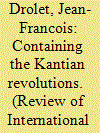

|
|
|
|
|
| Publication |
2010.
|
| Summary/Abstract |
This article examines the neo-conservative critique of global liberal governance. It provides a theoretically oriented assessment of the neo-conservative case against international law and human rights regimes, and draws out the main political and ethical implications for American democracy and American foreign policy. It is argued that the neo-conservative critique of global governance rests upon an interpretation of the normative order that weaves together democracy, individual rights and national autonomy through a volatile identity politics which is fundamentally at odds with both the pluralist character of 'Westphalian diplomacy' and the universal order of rights envisaged by advocates of global governance. More than just the policy autonomy of the US, what is really at stakes in those debates for neo-conservatives is the whole structure of cultural and socio-economic interests that is tied to the substantive interpretation of democracy upon which their domestic commitments to neo-liberal capitalism and liberal freedoms are predicated.
|
|
|
|
|
|
|
|
|
|
|
|
|
|
|
|
| 3 |
ID:
108510
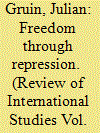

|
|
|
|
|
| Publication |
2011.
|
| Summary/Abstract |
A central concern of critical theory is that of how the forces of Modern reason cause certain logics to become reified in the name of rational progress. Two such logics - the ongoing spread of liberal capitalism, and territorial particularism - are simultaneously embodied within social institutions such as the World Trade Organization (WTO) that regulate the global economy, a phenomenon that occurs on the premise of maximising global welfare. Building upon a critical reading of Jürgen Habermas' theory of communicative action, this article undertakes an empirical immanent critique of the extent to which such logics repress the possibility of normative imperatives being considered within agricultural trade negotiations. Specifically, it argues that the dialectic of functionalist and communicative rationality, operating as a theoretical heuristic, reveals that the DDA is susceptible to an ethical indictment that arises from its inability to countenance the alternatives to the dual logics of neo-liberalism and state-interest that could otherwise emerge from a free and rational discussion. The nature of the WTO as a site of social action is revealed to be that of a closed epistemic community in which important normative claims are repressed, and as such, one in which the underlying rational bases for communication are fundamentally distorted.
|
|
|
|
|
|
|
|
|
|
|
|
|
|
|
|
| 4 |
ID:
086398
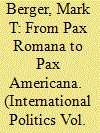

|
|
|
|
|
| Publication |
2009.
|
| Summary/Abstract |
This review paper focuses on the most recent cycle in the debate about the history and future of the 'New American Empire,' both in relation to the rise and fall of the Roman Empire specifically, and against the wider backdrop of the extensive debate about the US position in the changing global order more generally. It argues that much of the literature, including some of the books under review, rest on a misreading of history (Roman or otherwise) and a flawed grasp of the fate of the American ascendancy in relation to the contemporary crisis of the nation-state system and the far from unexpected boom-bust cycles of 'genuinely existing' liberal capitalism (globalization) in the twenty-first century. The washout on Wall Street in the latter part of 2008 could only come as a surprise to those who have not been paying attention to the vicissitudes of 'genuinely existing' liberal capitalism over the past 30 years or more. The paper argues that the American ascendancy, contrary to much of the contemporary prognostication, remains in its prime and Pax Americana will only begin a downward spiral when it has been successfully challenged and displace by an equally powerful and systemic alternative. In the meantime, the New American Empire, especially under new leadership, looks set to continue and even flourish.
|
|
|
|
|
|
|
|
|
|
|
|
|
|
|
|
| 5 |
ID:
132350
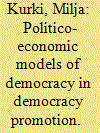

|
|
|
|
|
| Publication |
2014.
|
| Summary/Abstract |
This piece examines the curious nature of the conceptual foundations of current democracy promotion practice. I point out that while it is broadly accepted today that a liberal democratic politico-economic model should stand at the heart of democracy promotion, the scholarly literature on democracy-capitalism relationship stands in sharp contrast to this consensus in highlighting the contested nature of this relationship. Through a survey of some of the key theoretical texts on capitalism and democracy, and a brief empirical survey of politico-economic contours of current democracy promotion, this article highlights the poorly thought-through links between capitalism and democracy in current democracy promotion. It is argued here that un-reflexive conjoining of democracy and liberal capitalism and sidestepping of the plurality of nuanced positions on this relationship in scholarly literature is problematic and that revisiting the lines of contestation over the relationship between capitalism and democracy is deeply consequential for re-evaluating and revising democracy and market promotion policies in the current context of "dual crisis" facing democracy promoters today.
|
|
|
|
|
|
|
|
|
|
|
|
|
|
|
|
| 6 |
ID:
095800
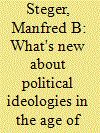

|
|
|
|
|
| Publication |
2010.
|
| Summary/Abstract |
The defeat of Nazi Germany in 1945 and the collapse of the Soviet Empire in 1991 enticed scores of Western commentators to relegate 'ideology' to the dustbin of history. Proclaiming a radically new era in human history, they argued that ideology had ended with the final triumph of liberal capitalism. This dream of a universal set of political ideas ruling the world came crashing down with the Twin Towers of the World Trade Center on 11 September 2001. Since then, influential political leaders have argued that the contest with jihadist Islamism represents much more than the military conflict. It is, as Presidents Bush and Obama put it, the 'decisive ideological struggle of our time'.1 Far from being moribund, then, competing political belief systems are alive and well in the early twenty-first century.
|
|
|
|
|
|
|
|
|
|
|
|
|
|
|
|